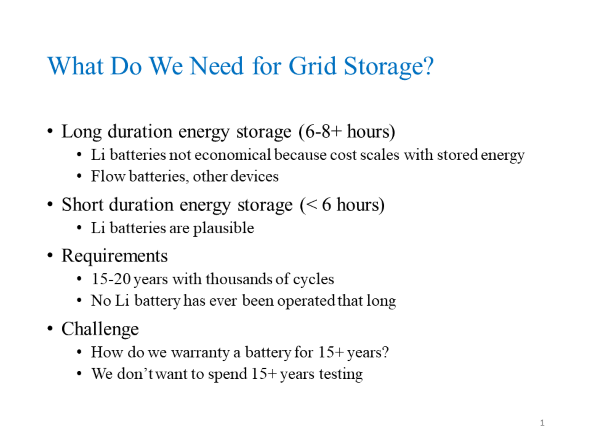Electrochem Seminar - 'Statistical and Machine Learning-Based Durability-Testing Strategies for Energy Storage' - Stephen Harris
Electrochem Seminar - 'Statistical and Machine Learning-Based Durability-Testing Strategies for Energy Storage' - Stephen Harris
Abstract
There is considerable interest in developing new energy storage technologies for the electric grid, but economic viability will require that manufacturers provide warranties guaranteeing 15+ years of life. While there are extensive efforts to make early predictions for the expected life of new storage technologies, we argue here that for purposes of pricing warranties and valuing second life potential—considerations that are crucial to whether the technologies can be commercialized—the full failure probability distribution, not just the expected life, is required. We use published battery cycle-life data to suggest efficient statistical and machine learning-based testing and analysis strategies that can rapidly estimate and also take advantage of the failure probability distribution. One approach is a Weibull analysis, which can (a) reduce the number of testing machine-hours required for setting a warranty, (b) quickly determine whether a new technology is better than a baseline technology, and (c) estimate the maximum intensity of testing acceleration that does not change the failure mode. A second approach is driven by the idea that all measured data — such as capacity or energy as a function of time or cycle number — is valuable and generated by an underlying latent function. The analysis employs a Gaussian process to find the underlying latent function, together with its uncertainties, which can be used to calculate the failure distribution.
Speaker
Stephen Harris
Steve Harris received a BS degree in chemistry from UCLA and a PhD in physical chemistry from Harvard University. After a Miller Post-Doctoral Fellowship at UC Berkeley, he began his career at the General Motors Research Labs. Apart from a stint at the Ford Scientific Research Labs, Steve worked at GM until 2011, when he was awarded a Miller Visiting Professorship in the UC Berkeley Chemistry Department. Since then he has worked in the Materials Science Division at Lawrence Berkeley Lab, and he is presently a Visiting Scholar in the Materials Science and Engineering Department at Stanford.
Steve’s work has ranged widely, and it includes studies of combustion chemistry, the kinetics and thermodynamics for growth of CVD films, aerosol dynamics modeling, fatigue failure in gears, and fracture mechanics in cast aluminum. When he returned to GM from Ford, he started work on Li-ion batteries, focusing on how the presence of heterogeneities and flaws affects ion transport, durability, and energy density. He is presently looking at the mechanics and electrochemistry at Li metal interfaces.
Harris has over 12,000 citations and an h-index of 61
